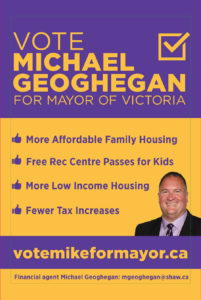Deeper stories and local news: BC & NATIONAL | VANCOUVER ISLAND | LANGFORD | COLWOOD | VIEW ROYAL | METCHOSIN | SOOKE | JUAN de FUCA | EVENTS
Friday, September 28 ~ National. Prime Minister Justin Trudeau spoke yesterday, September 27, with Mexican President-elect Andrés Manuel López Obrador.
“The Prime Minister and President-elect agreed to work closely together to further strengthen the dynamic partnership between Canada and Mexico,” it was stated in a news readout from the Prime Minister’s office today.
The two leaders were said to have “discussed NAFTA and the mutually beneficial economic and trading relationship between our two countries”.
Mexico’s incoming president (who will take office December 1) appears to bring a mindset to politics that is similarly progressive to what has unfolded under Trudeau in the last few years.
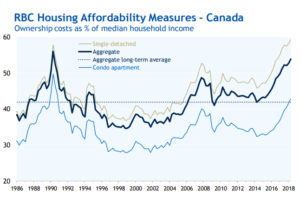
Friday, September 28 ~ BC/National. “Unaffordability is off the charts in Vancouver, Toronto and now Victoria,” says a major bank.
RBC in their September 2018 Economics Research report says the affordability measure hasn’t been this bad since 1990. The ownership costs to carry a home bought in the second quarter of 2018 would have taken up 53.9% of a typical household’s income. This is up sharply from 43.2% three years ago.
The unaffordability crisis requires political will and thoughtful action throughout the economic-impact sectors.
People can only afford so much, and the mortgage ‘stress test’ has in fact contributed to a market chill.
In the west shore, average sale prices in August were somewhat lower than a few months previous (indicating that ‘market cooling’): Langford: $708,970 (had been as high as the $772,000 range earlier this year) | Colwood: $727,447 | Sooke: $446,065 (had been well over half-a-million at points earlier this year).
Full editorial by West Shore Voice News
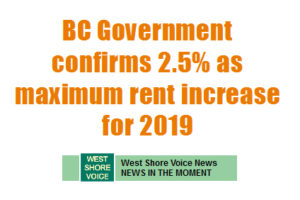 Wednesday, September 26 ~ BC. The Ministry of Municipal Affairs and Housing has cut the 2019 rent increase to ease pressure on renters, limiting it to inflation.
Wednesday, September 26 ~ BC. The Ministry of Municipal Affairs and Housing has cut the 2019 rent increase to ease pressure on renters, limiting it to inflation.
That means that effective Jan. 1, 2019, the annual allowable rent increase will be 2.5% (not 4.5% as the previous formula would have set).
“It’s simply not sustainable for renters, many of whom are on fixed incomes, to see their rent increase by more than inflation each and every year,” said Premier John Horgan.
“We have to eliminate the risk of such huge increases for renters. Our new approach strikes a balance between giving relief to renters while encouraging people to maintain their rental properties,” he said in a statement today.
The previous formula, set in 2004, allowed annual rent increases of 2% plus inflation.
“We recognize supply is key to bringing down rental costs in the long term, but renters have told us they are hurting and need help today,” said Selina Robinson, Minister of Municipal Affairs and Housing.
“That’s why we are taking careful steps to address the housing crisis and ease the pressure on renters, while also making sure that landlords have the tools they need to continue to invest in their rental properties,” Robinson said.
The government says that the Residential Tenancy Branch will work closely with landlord advocacy groups on expanded circumstances under which landlords could apply for an additional rent increase to reflect the costs of maintaining their rental properties.
“Our Rental Housing Task Force members have heard time and again that renters are struggling to pay yearly maximum rent increases, while basic repairs and building maintenance are left undone,” said Spencer Chandra Herbert, Rental Housing Task Force chair and Premier’s Advisor on Residential Tenancy.
“Taken together, these changes will make rent more affordable for British Columbians, while also helping ensure needed repairs are completed to maintain and improve rental housing,” said Herbert.
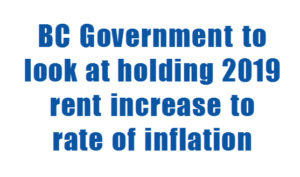 Monday, September 24 ~ BC. The BC Government has received a recommendation from its Rental Housing Task Force to ease pressure on renters while still recognizing the cost factors for rental property owners. [View this article on its own page]
Monday, September 24 ~ BC. The BC Government has received a recommendation from its Rental Housing Task Force to ease pressure on renters while still recognizing the cost factors for rental property owners. [View this article on its own page]
At present, under legislation passed in 2004, the rental increase for 2019 would be 4.5%. That would be fast on the heels of the 4% increase for 2018 that impacted renters this year.
Recommendations to government include:
- changing the maximum rent increase formula, from the current formula of inflation plus 2%, to inflation only (2.5% for 2019), which would remove the automatic 2% yearly increase.
- giving landlords the ability to apply for an additional increase if they can show the formula would not cover maintenance and other costs incurred.
This will be addressed by government in the legislature after the Legislative Assembly reconvenes October 1.
“Our recommendations follow the approach of Ontario and Manitoba and will keep rent more affordable while ensuring rental homes are maintained and improved,” said task force chair Chandra Herbert.
The recommendations and policy direction are supported by the BC Greens. “Today’s announcement is a strong step in addressing both current and ongoing rental affordability,” said BC Green Leader Andrew Weaver in a statement today.
“The rental task force represents the best of minority government. We have two different parties that have come together on an issue of shared interest and have developed solutions for government to consider,” said Weaver.
“This is exactly the type of collaboration that we need more of in our political system,” Weaver said, as the referendum on changing the electoral system to proportional representation looms October 22 to November 30.
 Sunday, September 23 ~ NATIONAL. September 23 to 29 is the first-ever Gender Equality Week in Canada.
Sunday, September 23 ~ NATIONAL. September 23 to 29 is the first-ever Gender Equality Week in Canada.
“This is a historic step, and a chance to celebrate gender equality as a key to Canada’s success,” said Prime Minister Justin Trudeau in a statement. “
We honour the people behind the progress we’ve made, and turn toward the work left to do make sure everyone has the opportunities they need to thrive.”
This year’s theme is ‘Gender equality benefits everyone’. ” More people participating fully across our society means a bigger workforce, a stronger economy, and better communities,” Trudeau said.
“Standing up for gender equality is a top priority for the Government of Canada. We appointed the first ever gender-balanced federal Cabinet and, in 2018, we put gender equality at the centre of both the federal budget and Canada’s G7 presidency. We have taken action to protect gender-diverse Canadians from discrimination, reduce the gender wage gap, support women entrepreneurs, and prevent and address gender-based violence.”
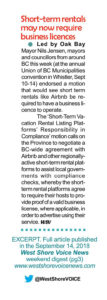 Friday, September 14 ~ BC. Short-term rentals may now require business licences.
Friday, September 14 ~ BC. Short-term rentals may now require business licences.
Led by Oak Bay Mayor Nils Jensen, mayors and councillors from around BC this week (at the annual Union of BC Municipalities convention in Whistler, Sept 10-14) endorsed a motion that would see short term rentals like Airbnb be required to have a business licence to operate.
The ‘Short-Term Vacation Rental Listing Platforms’ Responsibility in Compliance’ motion calls on the Province to negotiate a BC-wide agreement with Airbnb and other regionally-active short-term rental platforms to assist local governments with compliance checks, whereby the short-term rental platforms agree to require their hosts to provide proof of a valid business license, where applicable, in order to advertise using their service.
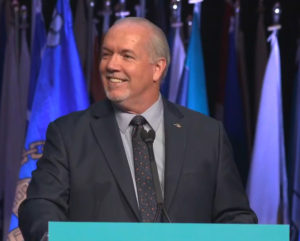
Friday, September 14 ~ VICTORIA. Today Premier John Horgan pitched for proportional representation in his speech at the Union of BC Municipalities convention in Whistler.
Horgan said that over his years in politics (first elected in 2005) he now supports a system in which the benefits of each person’s vote counts to produce a legislature of MLAs who represent what people in the constituency want and need done.
The Premier boasted the success of his present minority government with the BC Greens, an arrangement he says is based on the success of collaboration.
Tomorrow Saturday September 15, Green Party Leader Andrew Weaver and the BC Green Party will be holding a rally about proportional representation at 2pm, at the Victoria Conference Centre, 720 Douglas St.
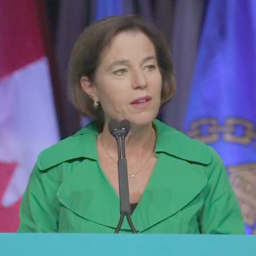
For small communities under 5,000 the funding will be 100%.
Both these announcements in a speech by Minister of Municipal Affairs and Housing Minister Selina Robinson today at the Union of BC Municipalities (UBCM) convention in Whistler drew genuinely enthusiastic applause.
This will support communities in various ways, including providing jobs and building local economies. The outcomes will be improvements for overall community activity and well-being. In turn this creates strong communities on all levels.
And on the matter of housing, Minister Robinson said: “There is no time to waste. We need to make sure we’re doing everything we can at every level of govt to deliver more affordable housing.”
She announced that another 2,500 modular homes (with support systems for occupants) will be made available to municipalities that can provide land for these projects.
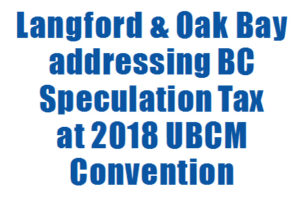 Friday, September 7 ~ WEST SHORE. The annual Union of BC Municipalities Convention is coming up Sept 10 to 14, this 115th year being held in Whistler, BC. Three municipalities from the Vancouver Island west shore area (Langford, Colwood and Sooke) are sending most of their councils.
Friday, September 7 ~ WEST SHORE. The annual Union of BC Municipalities Convention is coming up Sept 10 to 14, this 115th year being held in Whistler, BC. Three municipalities from the Vancouver Island west shore area (Langford, Colwood and Sooke) are sending most of their councils.
Langford Mayor Stew Young will be spearheading his council’s motion to allow municipalities to opt out of the BC Speculation Tax. Attending from Langford will be Councillors Denise Blackwell, Matt Sahlstrom, Lanny Seaton, Lillian Szpak, and Roger Wade. As part of the Langford motion, the City of Langford is suggesting that the BC Government put any funds received from a speculation tax on housing towards an affordable housing fund. On the island, the BC Government has already removed Parksville, the Gulf Islands, and Juan de Fuca Electoral Area from the tax.
Meanwhile, Oak Bay will propose that UBCM urge the Province to modify the approach in the current proposed Speculation
Tax to empower local governments to collect a levy on vacant residential properties and to require local governments that choose to impose such a levy to invest the revenues in non-market housing.
A 3-hour information session on Monday will explore ‘Achieving Affordability: Current Policy & Future Needs’. The session will look at creating the conditions for housing affordability that will require “ongoing, concerted actions to address a crisis that has built up over the past 30 years”…. “what are the implications of current government initiatives for local governments, and what further actions may be required?”
Colwood Mayor Carol Hamilton will be attending along with Councillors Rob Martin (who is running for Mayor in the current municipal election), Cynthia Day, Gordie Logan, and Terry Trace. Colwood has not brought forward any motions this year.
Sooke Mayor Maja Tait will be attending the UBCM convention along with Councilors Rick Kasper, Ebony Logins, and Kevin Pearson (who is running for Mayor in the current municipal election). Tait is a member of the UBCM executive, and is running again for mayor. Sooke has put forward a motion that would call on the Province to enact legislation that would protect wild salmon stock from the negative impacts of commercial salmon farms.
The District of Metchosin is being represented by Metchosin Mayor John Ranns along with Councillors Bob Graminga and Andy MacKinnon.
Cannabis tax revenue sharing and loss of the Greyhound bus service in western Canada are motions being brought forward by the UBCM executive. The LMLGA executive is bringing forward a motion on Employer Health Tax Impact on Local Governments.
The ‘Underfunding of Public Libraries’ motion being brought forward by Burns Lake looks at rural vs urban library systems and calls for the BC Government to ensure that funding formulas do not allow urbanization to threaten Public Library Association sustainability. Greater Victoria Public Library (GVPL) board chair Rob Martin says GVPL is not in favour of that motion.
The City of Victoria is bringing forward a motion about protecting coastal communities and waterways from oil spills. As well, Victoria — which now restricts the use of plastic bags by retailers — will be calling for the provincial government to work with local governments and retailers to introduce uniform, province-wide business regulations in relation to disposable plastic packaging, to substantially reduce the volume of disposable plastic packaging in local solid waste streams.
Travel costs for these trips to UBCM conventions are approved in municipal budgets. In 2019 the convention will be back in Vancouver (where it was in 2017) and in 2020 will be held in Victoria (where it was last held in 2016).
On Wednesday the convention will hear a speech by BC Green Leader Andrew Weaver, from BC Liberal Leader Andrew Wilkinson on Thursday, and from BC Premier John Horgan on Friday.
Friday, September 7 ~ BC. The BC Government has decided to cancel the provincial state of emergency that currently covers the entire province, thanks to cooler weather and progress in containing wildfires.
The improved weather outlook means wildfire resources can be best positioned on the remaining fires.
The state of emergency was declared on Aug. 15, 2018 and extended once. This past week, there was a significant reduction in the number of properties under evacuation order and many residents are now returning home. As such, the Province has decided that the powers granted under a provincial state of emergency are no longer required.
The provincial state of emergency was an extraordinary measure taken to ensure public safety and the coordinated response to this summer’s wildfire season, which has seen more than 1.3 million hectares burned to date.
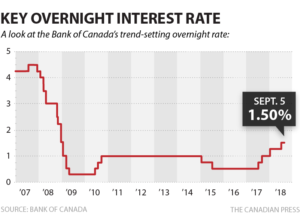
Wednesday, September 5 ~ NATIONAL. ECONOMIC ANALYSIS. The economy is okay but not scorching hot, as one way to look at the Bank of Canada not increasing its benchmark interest today.
At their last rate hike (on July 11) there was an indication that if the economy needed some level of containment that another interest rate hike would happen this month.
Previous to today’s non-hike, there were four interest rate increases in a row, 0.25 percent each, bringing the interest rate to 1.5 in July, where it remains.
Interest rates have made a very slow climb up from the record low of 0.25% seen in April 2009 after the onset of the Great Recession. It took nine years for most sectors of the economy to recover from the 2008 crash, including consumers, retail, businesses, and corporate investors. The financial industry overall fared very well on people’s struggle to recover.
Simplistically, the central bank raises its rate when it wants to cool down an overheated economy but cuts it when it wants to coax people to borrow money to spend and invest in a sluggish economy.
But things are not simple in what the bank and the federal government are purporting to be a robust economy. Businesses are hiring but sometimes can’t find enough help due to would-be workers not being able to afford housing in cities where the jobs are. Given the realities of trade issues with the United States, large-capacity investors are understandably cautious which is in effect a continuation of the minimal-action-mode seen under conditions of uncertainty during the long recession-recovery grind. Everyone is more cautious with a dollar, whether that be two or a million.
While economic reports boast increases and strength in exports, there is no magic to that as an economic fix. Exporting can involve long timelines for return on investment given the overhead of remote setups, travel and shipping costs.
The good news is that post-recession confidence was finally seen to return to the BC marketplace (perhaps a bit sooner in Ontario and Saskatchewan where the economy was more robust) by 2017, but with all sectors more cautious. There is a willingness in people and economy to move forward, which hopefully the Bank of Canada will not quash with any interest rate hikes again for a while.
The talk today in economic circles is to expect a benchmark rate increase at the end of October. But borrowers (whether for mortgages, lines of credit, or loans) are probably still working hard to hold steady where they are. Increasing the cost of everything again — from consumer retail on up — seems still just a bit too soon.
Tuesday, Sept 4. Urgent primary care centres are a key part of BC’s new primary health-care strategy, which is focused on improving services for patients through team-based care.
Through the strategy, government is providing funding over three years to recruit 200 family doctors and 200 nurse practitioners, and to hire 50 clinical pharmacists. These positions will help provide BC residents with faster and improved access to health care, said the BC Ministry of Health today.
The province’s first urgent primary centre is expanding with the opening of a Family Practice Learning Centre, announced Adrian Dix, Minister of Health. “The Family Practice Learning Centre (FPLC) is a first of it kind initiative that pairs people without a primary care provider with University of British Columbia (UBC) family medicine residents to receive ongoing team based care and treatment.”
“By being co-located with the Urgent Primary Care Centre, it will help deliver primary care services people currently need. Furthermore, it increases the number of opportunities for medical residents to be trained and supported in team-based care in Kamloops. This provides the foundation for these new physicians to continue serving patients in this region going forward,” explained Dix.
Interior Health has collaborated with the UBC Faculty of Medicine’s Department of Family Practice and the Thompson Region Division of Family Practice to develop the FPLC, located within B.C.’s first Urgent Primary Care Centre, which has seen nearly 1,000 patients since opening in Kamloops in June 2018.
The FPLC program enables residents to gain more hands-on experience under the guidance of eight fully licensed family physicians.
Patients will be referred through the HealthLink BC Kamloops waitlist, with priority going to people who don’t have a family doctor or nurse practitioner, but who have an illness or injury that requires immediate ongoing care. Since opening on August 27 there have been 32 patients for appointments at the FPLC.
Patients seeing a physician at the Family Practice Learning Centre will also have access to the team-based practice in the Urgent Primary Care Centre, which includes registered nurses, licensed practical nurses, physiotherapists and social workers.
“Training in a community is a powerful incentive for young physicians to stay and build their practice in that community,” said Doug Cochrane, Interior Health board chair. “This learning centre will improve services for patients currently without doctors in Kamloops by attaching them to a clinic where there is co-ordinated, comprehensive and quality care provided through team-based care.”
“The overall goals of the FPLC are to build family-care capacity in the community, provide access through timely appointments, help patients find a primary care provider, and promote team-based health care,” said Dr. Selena Lawrie, clinical instructor with UBC’s family medicine program and an Interior Health board member. “The model creates the opportunity for patients to be attached to the clinic for their immediate follow-up care. Patients could potentially then transfer from the clinic if a family practice resident chooses to open his or her own practice in the community at the end of training.”
“This is encouraging for the future of family medicine in our community,” said Dr. Chip Bantock, past chair of the Thompson Region Division of Family Practice.
Monday, September 3 ~ BC MAINLAND. Transit announcement on the first day back to class. Prime Minister Justin Trudeau, BC Premier John Horgan, Vancouver Mayor Gregor Robertson, and Surrey Mayor Linda Hepner will be making a transit announcement at the Surrey campus of Simon Fraser Univeristy (SFU) tomorrow afternoon Tuesday, September 4.
Sunday, September 2 ~ BC. The 2018 fire season is far from over. While temperatures have dropped, various levels of rainfall are occurring, and the smoke has cleared throughout most of the province, the risk of wildfires remains high. As of Thursday August 30, there were 518 wildfires burning in BC, with 53 being highly visible or posing a potential threat to public safety.
Everyone is urged to use extreme caution with any outdoor activity to ensure no human-caused wildfires are added to an already challenging workload. Fires caused by people’s activities are completely preventable and unnecessarily divert firefighting resources from naturally occurring wildfires.
From April 1 to Aug. 30, 2018, the BC Wildfire Service responded to 2,015 wildfires throughout the province, with 444 of those caused by people. Over 1.25 million hectares have been burned in the province to date, surpassing last year’s record of 1.21 million hectares burned — that’s the highest number of hectares burned in the province’s history.
Campfires are still banned throughout the province, with the exception of the “Fog Zone” on the west coast of Vancouver Island and the Peace Forest District and Fort Nelson Forest District in the Prince George Fire Centre. Information about current open burning prohibitions, including campfire bans: http://gov.bc.ca/wildfirebans
The Province’s natural resource officers and conservation officers conduct regular patrols throughout BC, and work closely with BC Wildfire Service staff to investigate any improper use of fire when an open-burning prohibition is in effect.
Friday, August 31 ~ VICTORIA. Following an incident where two BC Ferries workers fell to the water during training and were injured this afternoon, the BC Ferry & Marine Workers’ Union said: “This is the second time this year there has been a substantial failure regarding rescue boats, and these incidents cause our Union deep concern,” Graeme Johnston, BCFMWU Provincial President.
We anticipate there will be investigations by BC Ferries Services, WorkSafe and the Transportation Safety Board. Our thoughts rest with those injured and their families.
The incident on the Spirit of Vancouver Island vessel happened as the result of a failure with the davit (the ship’s crane used for lowering the rescue boat). Two crew fell into the water from a significant height. The workers were performing a drill with the rescue boat when they fell into the water, according to BC Ferries president and CEO Mark Collins.
The August 31 incident resulted in major travel delays for all passengers aiming to use the Tsawwassen to Swartz Bay route (Vancouver/Victoria) on the busy Friday morning ahead of Labour Day weekend, including those who had made reservations.
On Friday, BC Ferries said it’s too early to determine if the boat was broken or if there’s a problem with the brake release cable but they are investigating.

Friday, August 31 ~ NATIONAL. The federal government says it’s making smart, ambitious investments to support Canadian autoworkers, create and protect jobs, and keep Canada’s auto sector competitive globally.
Prime Minister Justin Trudeau, today announced up to $9.46 million in funding to the University of Ontario Institute of Technology (UOIT) to enhance its Automotive Centre of Excellence (ACE) in Oshawa, and to create new research and development jobs in the automotive industry.
ACE is a world-class facility that produces cutting-edge automotive technologies. The new investment will almost double the number of full-time jobs at the facility, generate new training opportunities, promote research and development, and encourage the advancement of cleaner and safer technologies.
The new funding will also support the integration of a Moving Ground Plane – a moving belt that acts like a road – and other state-of-the-art aerodynamic and aero-acoustic enhancements, which will help researchers create cleaner, safer, and more reliable vehicles.
Every part of moving travel can be expanded upon by enhancing how autonomous vehicles interact with each other on the road.
Construction of the $12.5 million project (75% of that coming from the federal government) is expected to start in September with completion set for early 2020.
ACE is a 16,300 sq m facility housing one of the largest and most sophisticated wind tunnels in the world. The tunnel simulates weather conditions, such as severe wind, humidity, snow, ice, and desert heat, to measure the safety, durability, and efficiency of different vehicles.
Thursday, August 30 ~ NATIONAL. Today in Ottawa the Prime Minister will speak with the Premiers of Canada’s provinces and territories regarding ongoing NAFTA negotiations.
Wednesday, August 29 ~ BC. BC’s wildfire-driven provincial state of emergency as first declared August 15 has been formally extended by 14 days, through the end of the day on Wednesday September 12, 2018. It may be further extended or rescinded as necessary. It applies to the entire province.
This ensures that all needed resources can be delivered in a coordinated response to the wildfire situation and continue to ensure public safety, which remains the provincial government’s top priority.
As of this morning, 534 wildfires are burning in BC (was at 526 a week ago), with 34 evacuation orders affecting approximately 3,200 people, plus 53 evacuation alerts impacting approximately 21,800 people.
The Province’s decision to extend the provincial state of emergency will support the significant number of people who remain under evacuation orders and alerts. The state of emergency gives agencies, such as Emergency Management BC, the fire commissioner, the Ministry of Forests, Lands, Natural Resource Operations and Rural Development, and the RCMP, the authority to take every action necessary to fight the wildfires and protect residents and their communities.
Wednesday, August 29 ~ BC. OP-ED by BC Minister of Education Rob Fleming:
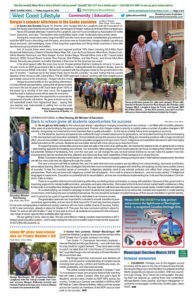 As we get our kids ready for the school year ahead – adjusting to changing schedules and new routines – I am filled with incredible optimism. After years of underfunding by the previous government, Premier John Horgan made it a priority to quickly make a number of positive changes in BC schools, recognizing no investment is more important than a quality education – it’s the key to a better future and a prosperous economy.
As we get our kids ready for the school year ahead – adjusting to changing schedules and new routines – I am filled with incredible optimism. After years of underfunding by the previous government, Premier John Horgan made it a priority to quickly make a number of positive changes in BC schools, recognizing no investment is more important than a quality education – it’s the key to a better future and a prosperous economy.
For the students, teachers and parents who suffered through crowded classrooms for generations, we’ve funded the hiring of a record-breaking 3,700 new teachers and education assistants.
School districts across the province are actively filling any remaining positions with a huge recruitment effort, plus we have added more spaces in teacher education programs to bring in more French, Indigenous and specialist instructors to add more highly skilled educators to BC schools. Students are now better served with more resources to help them thrive.
More…/ Read the full Op-Ed
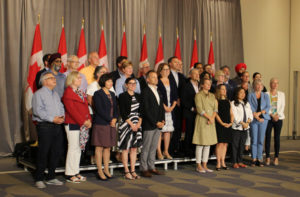
Over the past three years, the Government has taken significant strides to fulfill its mandate and deliver meaningful results for Canadians. The new mandate letters reflect ongoing, top priorities – including growing the economy, strengthening the middle class, advancing reconciliation with Indigenous peoples, and fighting climate change – while establishing new goals to further position Canada for growth and success.
The most currently updated Mandate Letters (as of August 28, 2018) are those of International Trade Diversification (Jim Carr); Tourism, Official Languages and La Francophonie (Melanie Joly); Natural Resources (Amarjeet Sohi); Infrastructure and Communities (Francois-Phillipe Champagne); Canadian Heritage and Multiculturalism (Pablo Rodriquez); Border Security and Organized Crime Reduction (Bill Blair); Small Business and Export Promotion (Mary Ng); Seniors (Flomena Tassi); Fisheries, Oceans and the Canadian Coast Guard (Jonathan Wilkinson).
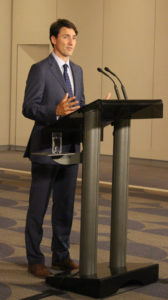
The government says that when the Prime Minister first made ministerial mandate letters public in November 2015, that he ushered in a new era of openness and transparency.
“Today’s announcement reaffirms the Government’s commitment to be the most open and accessible government possible, and deliver real, meaningful progress for Canadians.”
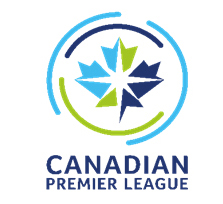 August 27 ~ NATIONAL. Today the Canadian Premier League announced that soccer players from coast to coast will have an opportunity to earn a spot on a professional club roster through the #GotGame Open Trials.
August 27 ~ NATIONAL. Today the Canadian Premier League announced that soccer players from coast to coast will have an opportunity to earn a spot on a professional club roster through the #GotGame Open Trials.
Canada’s new men’s professional soccer league will host the trials in seven cities across the country beginning in September. The trial on Vancouver Island (likely at Westhills Stadium in Langford) will be held November 5 to 6.
Registration is required in advance. Open to males age 16+. Interested participants can go to canpl.ca/gotgame. The registration fee is $200 per person.
On Day 1 of the tryouts each player will be evaluated through a series of fitness exercises and testing, soccer specific drills and assessments. At the end of Day 1, a limited number of players will be selected and invited back for Day 2, which will focus on small-sided and 11 vs. 11 soccer matches.
See full article about the trials and registration details here: https://islandsocialtrends.ca/?page_id=13137
See feature article on the announcement of Michael Silberbauer as the new Pacific FC coach, on page 1 in the August 24, 2018 issue of West Shore Voice News, or full version of article with more photos
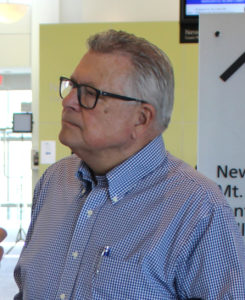
Friday, August 24 ~ NATIONAL: from Nanaimo. Minister of Public Safety and Emergency Preparedness Ralph Goodale was quickly heading to the annual meeting of the Five Eyes security alliance in Australia, right after the cabinet retreat that wrapped up Thursday afternoon August 23 in Nanaimo. “They are a very reliable stable group of countries that have had an important security alliance since World War II: Australia, NZ, Canada, the US and UK.” [View this article on its own page]
“We work very hard to ensure the security and safety of our own countries. But that obviously makes a major contribution to security around the world,” Goodale told West Shore Voice News. “As a middle-size country, Canada has a very constructive broker role to play in the middle to try to find consensus, to find practical solutions to very difficult safety and security issues. It’s an ongoing dialogue that takes place among these countries every day, but once a year the ministers get together to meet in person.”
WSV: Should Canadians be concerned about loss of privacy? It seems to be almost gone. Goodale: “It’s a product in many ways of technology. Canadians will have an intense debate about what information is known or not known about them by a government agency, but they’ll give all their personal information over the Internet to a commercial entity or to someone at the other end of a tweet that they don’t even know. So there’s a very large element of personal responsibility that comes into play here. People need to recognize in this day and age of information technology that’s changing and innovating quite literally many times a day, that the old assumptions about what’s private are being challenged. And when the government is involved we work very closely all the time with the privacy commissioner who is very proactive and very assertive (and that’s a good thing!) to make sure that the government is respecting the privacy of Canadians and that we’re following all the appropriate laws and codes.”
WSV: Is this something that cabinet deals with top of mind? Goodale: “Privacy is quite often a very important discussion. The privacy commissioner is there to be the ever-present watchdog but Cabinet ministers are very alert to this too.”
WSV: On cannabis legalization, are there any recommendations for the public? Goodale: “The law doesn’t change until the 17th of October. This is not an instantaneous event. This is a process that is transforming a legal regime that has existed for 100 years, to something that’s entirely different. So it’s a massive undertaking. People need to respect the process as it goes along. You can understand people wanting to anticipate all the what-if’s. But make sure you’re following the law in the mean time. Don’t jump to conclusions before the law actually changes.”
WSV: How quickly will the legal system give pardons for simple possession? Goodale: “We’ve undertaken to examine that as soon as the law does change. The discussion will be ongoing to make sure that people are being treated fairly. Obviously the old law is still the old law and all of the rules apply. When that changes on October 17th then the government will turn its mind to what steps need to be taken to treat people with fairness.”
Back in April 2018, Prime Minister Justin Trudeau said threats of cyber attacks will continue to grow as the world becomes more digitized. He had met on the sidelines with the prime ministers of Australia, New Zealand and the UK during the Commonwealth Heads of Government Meeting (CHOGM) in London, to solidify their position on Russia’s persistent cyber warfare attacks on businesses and government institutes.
The upcoming August 2018 meeting will serve to significantly advance transnational security collaboration across a broad range of functional problems and mission areas, said Australia’s Home Affairs secretary back in June.
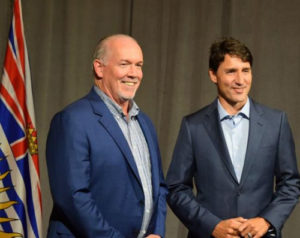
But to hear more about the wildfires first hand, Trudeau will take a quick trip to the Prince George Fire Centre to meet with BC Fire Protection Officer Tom Reinboldt on Thursday morning at 7:15 am, August 23, after which he will meet with BC emergency management staff and volunteers.
On Day 1 of the retreat in Nanaimo, Trudeau first met with BC Premier John Horgan. They discussed the TransMountain Pipeline but reportedly neither side changed positions.
Earlier on Tuesday, Horgan had visited the Prince George Fire Centre along with federal Defence Minister Harjit Sajjan, to see the wildfire situation up close and hear about management of the fires under the present State of Emergency as declared August 15 in BC. Then back to Nanaimo to continue his Cabinet retreat at 10 am Thursday morning. He will report out to media mid-afternoon at the Vancouver Island Conference Centre.
Premier Horgan said: “As a born and raised Vancouver Islander, I was racking my brain trying to think of the last time a federal cabinet would have come to hold a meeting here and I can’t remember it ever happening. So, it’s a delight to have the prime minister and his team here.”
Horgan praised the federal government’s response to the wildfires. Seeing different levels of government working together on the crisis, “I think gives comfort to the public that federal, provincial, municipal, Indigenous leaders all coming together, speaking with one voice about the courage of our first responders and the tragedy that’s hitting families and people throughout British Columbia.”
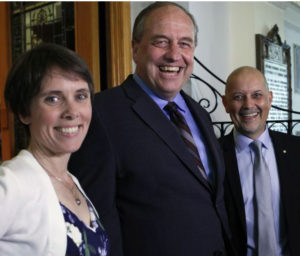
Andrew Weaver, Sonia Furstenau and Adam Olsen will host the community forum tonight at Alix Goolden Hall, 907 Pandora Avenue, in downtown Victoria, from 7 pm to 8:30 pm.
“The MLAs will hear concerns and questions from residents regarding the key issues in their communities, which will inform the BC Greens as they enter the Fall legislative session,” it was stated in a BC Greens release this morning.
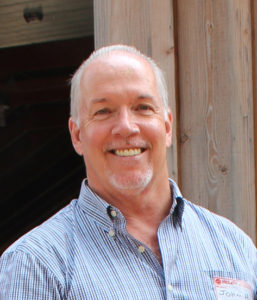
Horgan told the crowd that he’s pleased with the progress made by his government in the last 13 months. “I reached out to the Green Party and to the BC Liberals,” he said, noting that the current Speaker of the House is a BC Liberal MLA.
The BC NDP approach is about “working with their neighbours to get a better outcome for everybody”, Horgan told the crowd outdoors.
Horgan touched briefly on the upcoming referendum on proportional representation, saying that all governments but one in the last 40 years in BC have been given 100% of the power by a minority of the voter count. He suggested that the mail-in ballot process will be easy for everyone.
Friday, August 17 ~ BC. As of this afternoon, August 17, there are 556 fires burning throughout BC, with 55 of those being fires of note. [View this article on its own page]
“I’ve never seen that many at one time and over such an area,” said Kevin Skrepnek, Chief Fire Information Officer, BC Wildfire Service, today during a media conference. Just today, there are 14 new fires.
If a wildfire is especially visible or poses a threat to public safety, the BC Wildfire Service classifies it as a “Wildfire of Note” and provides detailed updates as information becomes available.
So far, the cost to the province for fighting wildfires is $242 million in this 2018 wildfire season, Skrepnek reported.
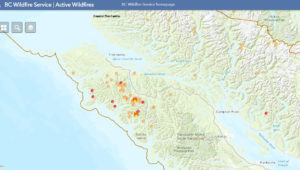
On northwest Vancouver Island, here are fires of note at Pinder Creek & Zeballos. Link to wildfires of note available on this page: https://www2.gov.bc.ca/gov/content/safety/wildfire-status/wildfire-situation
There is the potential for lightning in the southern part of the province, and the far northeast. “If we see lightning, it will be dry, which guarantees fires,” Skrepnek said. “Conditions are dry and warm. Smoke is going to be an ongoing concern for visibility. Forecast is bone dry. There is no rain on the horizon.” Conditions next week are forecast as relatively static. A ridge of high pressure is expected to break down after Wednesday next week (August 22), with the potential for showers but which bring more wind and lightning, the Chief Fire Information Officer explained. “With no major rain in sight, we’re bracing for the situation to continue for the weeks ahead.”
Other officials addressed media, including Doug Donaldson, Minister of Forests, Lands, Natural Resource Operations and Rural Development; and Jennifer Rice, Parliamentary Secretary for Emergency Preparedness, who were joined by representatives from the Canadian Armed Forces, BC Wildfire Service, Ministry of Health, Emergency Management BC and the RCMP.
There are presently 28 fires impacting 2,905 properties across BC, with 49 evacuation alerts affecting 11,300 properties province-wide. Across the affected areas of BC there are 13 Emergency Support Services (ESS) centres actively in place.
Provincial Health Officer Dr Bonnie Henry says wildfire smoke is “dynamic and changing rapidly… it comes and goes in space and time.” She is recommending that people do not evacuate for smoke alone. “It is extremely stressful to be evacuated from home and community. This can divert resources away from people who are threatened by the wildfires themselves.”
“If you have asthma or cardiopulmonary disease or are pregnant, you should reduce your exposure in any way,” says Dr Henry. “Stay indoors, and use a portable air cleaner to create a ‘clean room’,” says Dr Henry. “Regular exercise is important, but when air is smoky move those activities indoors. If you’re outdoors for work or helping on fires – use appropriate protective equipment. Have your rescue medications available,” she said.
The RCMP reported that 200 officers and civilian support staff are assisting with wildfire efforts.
The Canadian Armed Forces presently have 200 soldiers in the Okanagan region with a camp near Merritt, to work alongside their BC Wildfire partners .. notably with mop-up tasks (attended to smaller hot spots and clearing debris) so that frontline BC wildfire expertise can focus on the front lines.
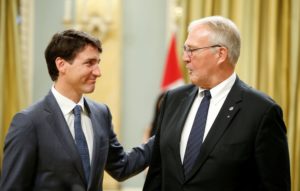
Wednesday, August 15 ~ BC. Prime Minister Justin Trudeau will hold a Cabinet retreat in Nanaimo from August 21 to 23. It will be the first meeting of the new Cabinet before Parliament resumes in September.
During the retreat, Trudeau and and ministers will “discuss ways to deliver economic growth and create good, middle class jobs for Canadians,” it was stated in a news release yesterday.
Discussions will focus on diversifying international trade, eliminating trade barriers between provinces and territories, and maintaining the integrity and security of Canada’s borders.
Since launching the historic Oceans Protection Plan in 2016, the Government says it has played a leading role to protect Canada’s oceans and coasts, and support coastal communities such as Nanaimo.
“I look forward to meeting with our new Cabinet in beautiful Nanaimo, British Columbia. Nanaimo is a gateway to Canada’s markets and a tourist destination known around the world. It is a perfect setting to discuss how we can promote Canadian exports, expand tourism, and diversify our trading partnerships, to continue making life better for people from Nanaimo to Corner Brook.”
Trudeau’s July 18 cabinet shuffle indicated a more intent focus on trade protection and diversification, border issues, resources and economy. See the July 20, 2018 issue of West Shore Voice News (page 1).
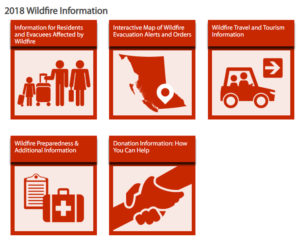 Wednesday, August 15 ~ BC. [Text of BC News release, August 15, 2018]. The British Columbia government has declared a provincial state of emergency to support the province-wide response to the ongoing wildfire situation. [Wildfire information at Emergency Info BC: https://www.emergencyinfobc.gov.bc.ca ]
Wednesday, August 15 ~ BC. [Text of BC News release, August 15, 2018]. The British Columbia government has declared a provincial state of emergency to support the province-wide response to the ongoing wildfire situation. [Wildfire information at Emergency Info BC: https://www.emergencyinfobc.gov.bc.ca ]
Mike Farnworth, Minister of Public Safety and Solicitor General, made the declaration based on the recommendation from BC’s wildfire and emergency management officials.
The state of emergency is initially in effect for 14 days, once issued, and may be extended or rescinded as necessary. The state of emergency applies to the whole province and ensures federal, provincial and local resources can be delivered in a coordinated response to protect the public, which remains the provincial government’s top priority.
“Public safety is always our first priority and, as wildfire activity is expected to increase, this is a progressive step in our wildfire response to make sure British Columbia has access to any and all resources necessary,” Farnworth said. “Taking this step will further ensure we can protect the public, property and infrastructure, and assist with firefighting efforts.”
As of August 14, there were 566 wildfires burning in BC, with 29 evacuation orders affecting approximately 3,050 people (1,521 properties), in addition to 48 evacuation alerts impacting approximately 18,720 people (9,359 properties).
The extended weather forecast calls for continued hot and dry conditions, with risk of thunderstorms in some parts of the province.
Currently, more than 3,372 firefighters and contractors are actively engaged in fighting fires in all fire regions of the province. This includes 1,427 BC contract personnel, as well as 436 out-of-province personnel from Alberta, New Brunswick, Northwest Territories, Quebec, Saskatchewan, Parks Canada, Australia, Mexico and New Zealand.
The federal government has responded to and accepted British Columbia’s request for assistance. In the coming days, federal personnel and resources will be arriving in BC to assist with wildfire efforts.
“Given the unpredictable behaviour of wildfires and the number of significant wildfires in all areas of the province, we’re bringing in the additional resources we need to keep people and communities as safe as possible,” said Doug Donaldson, Minister of Forests, Lands, Natural Resource Operations and Rural Development. “We’re asking British Columbians to do their part and follow burning bans and restrictions to prevent human-caused fires.”
The state of emergency gives agencies, such as the Ministry of Forests, Lands, Natural Resource Operations and Rural Development, Emergency Management BC, the fire commissioner and the RCMP, the authority to take every action necessary to fight the wildfires and protect people and communities.
Declarations of provincial states of emergency may be issued by the minister responsible under the Emergency Program Act. The provincial government can extend the period of a declaration made by the minister responsible, for further periods of time. During the 2017 wildfire season, the Province was in a provincial state of emergency for 10 weeks, from July 7 to September 15.
The last provincial declaration of state of emergency before the 2017 wildfire season was issued in August 2003, to deal with wildfires.
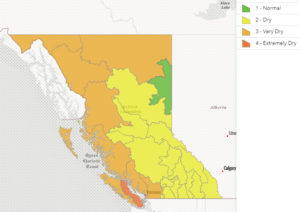
As a result, a maximum reduction of water use is recommended and regulatory action may become necessary.
The west side of Vancouver Island remains at Level 3 and will be re-evaluated as conditions deteriorate, the government says.
A map of the affected areas is available online: http://ow.ly/BY7z30lpdi0
The Province is urging all surface water and groundwater users, including residents, industry, farmers and municipalities, to voluntarily reduce water consumption.
Sunday, August 12 ~ NATIONAL. Today Sunday August 12 is International Youth Day. This year’s ‘Safe Spaces for Youth’ theme encourages youth coming together to actively participate in society without fear or intimidation.
“When young people have access to safe and welcoming spaces, they are more engaged in their communities,” says Prime Minister Justin Trudeau in a statement, as part of a new phase of recruitment for his government’s youth council (third round since 2015).
Of the 10 newest members of the 21-member youth council, from BC is Jack Campbell who developed an app with instructions on how to treat a fentanyl overdose.
Friday, August 10 ~ NATIONAL. This week’s most far-reaching news story has been how Canada is seemingly now in the tight clamp of Saudi Arabia. Economically we’re a small country, figuratively now very publicly twisting and squirming to the delight of a middle-eastern country built strong by the luck of having oil underfoot. [ Read the rest of this editorial on its own page at https://islandsocialtrends.ca/?page_id=12757 ]
Friday, August 10 ~ BC. The BC Government announced today August 10 that it is now accepting private cannabis retail store licence applications, which will allow for the sale of non-medical cannabis in the province.
The Liquor and Cannabis Regulation Branch (LCRB) has posted a complete suite of application materials and guidelines found at this link: www.gov.bc.ca/cannabisregulationandlicensing
In July, the LCRB posted detailed information at the above link regarding applicant eligibility requirements and the rules that will govern future private non-medical cannabis retail stores. “Prospective applicants are strongly encouraged to carefully review all of this material prior to applying.” it was stated in a news release from the Ministry of the Attorney General today.
 Thursday, August 9 ~ BC. The BC Government says it is aiming to modernize the Insurance Corporation of British Columbia (ICBC) rate design to make insurance fairer. [Read this article on its own page]
Thursday, August 9 ~ BC. The BC Government says it is aiming to modernize the Insurance Corporation of British Columbia (ICBC) rate design to make insurance fairer. [Read this article on its own page]
“The provincial government wants to make sure BC drivers pay ICBC premiums that more fairly and accurately reflect the risk they represent on the roads,” it was stated in a new release today August 9, following a media conference in Vancouver.
ICBC’s current rate structure is over 30 years old. It is built around insuring the vehicle rather than the driver, and allowing discounts to drivers despite multiple crashes. Combined, this has resulted in British Columbians with crash-free, clean driving records subsidizing bad drivers, including those with multiple accidents. David Eby, Attorney General, said the submission ICBC is making to the BC Utilities Commission (BCUC) will include revenue-neutral proposals aimed at levelling that playing field.
“We want to modernize ICBC so that British Columbians pay according to their crash history, driving records and level of risk, and take responsibility for their driving habits. It’s only fair,” said Eby.
“Right now, the system is broken. A driver with no crashes could be paying the same premium as a driver with three at-fault crashes in a year. We heard from British Columbians that their insurance rates need to be fair and we agree – good drivers shouldn’t have to continue paying more to cover the costs for those who cause crashes or present a higher risk on our roads.”
The proposed changes align with feedback government received from nearly 35,000 British Columbians on how to make insurance fairer. Key proposed changes to basic insurance include:
- Moving to a driver-based model, so that at-fault crashes are tied to the driver and not the person who owns the vehicle;
- Increasing insurance discounts for drivers with up to 40 years of driving experience, up from the current limit of nine years; and,
- New discounts available for vehicles with original, manufacturer-installed automatic emergency braking technology and for vehicles driven less than 5,000 km per year.
If approved by the BCUC, these changes will benefit an estimated two-thirds of ICBC’s customers. The changes will not increase the total funds that ICBC collects through basic policies, but instead will rebalance individual driver premiums and reset the way rates are determined.
“The changes we are proposing are the most significant updates to how ICBC’s basic insurance premiums are set in more than 30 years,” said ICBC Chair Joy MacPhail. She said that when British Columbians were this year asked for their feedback that “one message came out loud and clear – lower-risk drivers shouldn’t be paying the same as some high-risk drivers”. MacPhail said: “We wholeheartedly agree.”
Other proposed changes include:
- Basic insurance discounts for inexperienced drivers will be adjusted to better reflect their risk;
- At-fault crashes will have a larger impact on the premium a driver pays;
- Rate classes and territories data will be updated for the first time in more than 10 years to reflect significant changes in traffic density, population growth and changes in the urban infrastructure; and,
- An increase to the Driver Penalty Point (DPP) and Driver Risk Premium (DRP) programs of 20% in fall 2018 and 20% in fall 2019, as previously announced.
ICBC is also proposing a “transition cap” that limits how much the premium can change annually based on a customer’s driving record and at-fault crash history. Most customers will fully transition to their new basic premium within three years under the proposed changes.
The BC government has directed ICBC to file an application with the BCUC by August 15, 2018. Subject to approval, the changes would come into effect September 2019. Separately, the government has also directed ICBC to move the timing of its basic insurance rate application to the BCUC from late August to December to align any rate change with the other product changes already announced.
Other things to know:
- ICBC basic insurance is the mandatory coverage drivers need for a vehicle in B.C. It helps ensure that British Columbians who own and drive a motor vehicle in this province are protected with a basic level of coverage.
- Under the model ICBC currently uses to determine premiums:
* A customer at the highest level and receiving the top discount can have up to three crashes in one year and still pay the same basic premium as a driver who is crash free.
* Over 40% of claims are forgiven each year, which means the cost of those claims is borne by everyone, including drivers who do not cause crashes.
* At-fault crashes affect the vehicle rather than the driver, allowing some drivers to hide their true risk and avoid paying a fair rate. - Based on today’s rates, in the first year of this transition, an estimated 67% of customers would see basic insurance premiums that reflect a lower risk:
* 39% of all drivers – up to $50 reduction
* 13% of all drivers – between $50 and $100 reduction
* 15% of all drivers – more than $100 reduction - Based on today’s rates, in the first year, an estimated 33% of customers would see basic insurance premiums that reflect a higher risk:
* 11% of all drivers – up to $50 increase
* 5% of all drivers – between $50 and $100 increase
* 17% of all drivers – more than $100 increase -
 Tuesday, August 7 ~ BC. The red-light cameras at 140 high-crash intersections throughout BC are now operating at all times – up from six hours a day – to help reduce deaths and serious injuries on the province’s roads. Today’s announcement was made by the Ministry of Public Safety and Solicitor General. [read this article on its own page]
Tuesday, August 7 ~ BC. The red-light cameras at 140 high-crash intersections throughout BC are now operating at all times – up from six hours a day – to help reduce deaths and serious injuries on the province’s roads. Today’s announcement was made by the Ministry of Public Safety and Solicitor General. [read this article on its own page]
A map of the 140 ISC locations throughout BC is on the ICBC website: https://www.icbc.com/road-safety/community/Pages/Red-light-cameras.aspx
In the Greater Victoria area there are two camera locations: at Shelbourne Street at Hillside Avenue (62 crashes per year, resulting in 21 injuries/year: 2009-2013) and on Hwy 1
(Trans Canada) at Tillicum Road in Saanich (52 crashes per year, resulting in 29 injuries/year: 2009-2013). Travelling up island? There is also an operable camera at Trans Canada Hwy at Trunk Road in Duncan (49 crashes per year, resulting in 24 injuries/year: 2009-2013).
“For too long, cameras with a proven record of curbing red-light runners and the serious crashes they cause were not operating at full capacity,” said Mike Farnworth, Minister of Public Safety and Solicitor General today in a news release.
“Last year, we saw a record 350,000 crashes in BC, with about 60% of them happening at intersections. The full activation of these cameras is overdue and an important step for safety on some of our busiest roadways.”
Since announcing the move to full activation in September 2017, the Intersection Safety Camera (ISC) program has updated service and data-transmission capacity. It also increased its staff to review incidents and process additional tickets in a timely manner. Some locations began to operate at higher levels in November 2017, with all locations fully activated by the end of July 2018.
The Province’s increased ISC activation is consistent with international jurisdictions and every province west of Quebec. In BC, a red-light camera offence occurs when a vehicle enters an intersection after the signal light turns red. The vehicle’s registered owner is responsible for the ticket even if they are not driving, but does not receive penalty points on their licence.
In March 2018, the ministry announced plans to add technology at certain ISC locations to ticket the fastest drivers passing through those intersections on red, yellow or green lights. Analysis of crash and speed data is ongoing to determine which locations will receive this technology. New signs will warn approaching drivers about the enhanced intersection enforcement. The number and locations of the speed-activated cameras will be announced in fall 2018.
In BC, 60% of all crashes occur at intersections. Intersection crashes are often the most serious, because they may involve head-on and side-impact collisions. On average, over 11,000 crashes happen at ISC sites each year. ICBC’s 2016 Road Safety Tracking Study found that 81% of BC motorists supported the existing ISC program.

Monday, August 6 ~ NATIONAL. Shuffling the NDP leadership.
UPDATE August 7 – Singh will make his official announcement on Wednesday, August 8, 11:30 am to 1:30 pm, in Burnaby at 5784 Byrne Road.
At the quiet tail-end of the August long weekend, Elections Canada announced that on Friday, August 3 the Chief Electoral Officer of Canada received official notice from the Speaker of the House of Commons that the seat for Outremont (Quebec) is vacant.
The by-election date must be announced between August 14, 2018 and January 30, 2019. By-elections must last at least 36 days and be held on a Monday. The earliest date for the Outremont by-election could be Monday, September 24, 2018.
Outgoing NDP Leader Thomas Mulcair publicly stated in December 2017 that he would give up his seat in June of this year. The NDP confirmed that Mulcair sent his letter of resignation to the Speaker of the House on July 21, with notice of vacating his MP seat as of midnight, August 3.
NDP Leader Jagmeet Singh (a former Ontario MPP) — who was voted in by the NDP membership at the party’s leadership convention October 1, 2017 in Toronto (with a resounding 53.6% on the first ballot), did not look to run in Outremont. That’s even though it usually considered politically strategic for a party leader to have a seat in the House of Commons, so as to be actively seen by Canadians.
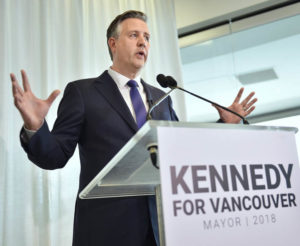
Singh would be the first incoming federal leader to look for his first House of Commons seat outside his home turf. Brian Mulroney, Jean Chrétien and Joe Clark (in his second incarnation as Tory leader) all initially ran successfully in by-elections in Atlantic Canada. They returned to their respective provinces in the subsequent general election.
No party has tried to parachute an out-of-province leader into Quebec, let alone in a riding that would not be considered a safe seat. Before Mulcair scored the first of four back-to-back victories in Outremont in 2007, the riding had carried a consistent Liberal track record.
For the Toronto-based Singh, there are similar urban issues in Burnaby (within the Greater Vancouver area) including transportation, uncertain and precarious work, tax loopholes for the super rich, rising out-of-pocket health costs and longer wait times, housing unaffordability, and environmental consciousness.
NDP support for Singh would be strong in BC, where of all 14 NDP seats in the House of Commons are held in BC (six of those on Vancouver Island), and BC Premier John Horgan leads an NDP government.
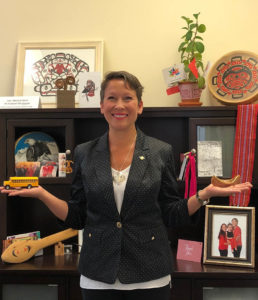
Upbeat and excited to be doing the full scope of her high-profile job as the Minister of Advanced Education, Skills and Training since July 2017, Melanie Mark also proudly carries the role of matriarch as a member of her nation and clan and house. “I take on those responsibilities out of respecting our family.”
“I don’t have a private life,” with all that’s on her plate, she says. “The public doesn’t understand inter-generational trauma” -– something front of mind for Mark for what her extended family experienced through the residential school system.
She is Nisga’a, Gitxsan, Cree, Ojibway, French and Scottish and a proud mother of two girls – Maya, 15, and Makayla, 7.
Melanie Mark was appointed Minister of Advanced Education, Skills and Training on July 18, 2017. A lifelong champion of children, youth and her community, she was elected MLA for Vancouver-Mount Pleasant in 2016 and re-elected in 2017. She is the first female First Nations Member of the Legislative Assembly of British Columbia and the first female First Nations Cabinet Minister.
On a typical day there are meetings, travel and public appearances. In the evening — sometimes quite late — she’ll get calls from former youth in care who she has taken under her wing. She also recently married.
What keeps her going? “I had such an allergic reaction to injustice, I want change. I get lit up when I have a feeling that something’s just wrong,” Minister Mark told West Shore Voice News this week.
Saying she’s always been known for “having a big mouth and seeing through a glass half full” has given Mark the “courage to stand up against the storm”. If something’s wrong, her response is: “What are we going to do about it?”
First chatting with Ms Mark at the Royal Roads University (RRU) grad scholarship funding announcement June 26 in Colwood, it was an opportunity to ask about the setbacks that propelled her forward. She also talked about maintaining her broader family ties even thought they “see her as different” as she propels ever forward in the mainstream society that originally held the source of her oppression.
She gets comments from relatives like “we’re not like you”, and from a First Nation chief (who refered to her as a chief) saying she “sits alone” at their leadership table (because she now is a cabinet minister in the mainstream government) and belongs to a ‘different family’, the BC NDP.
So, oddly enough, battling to change the system from within both immerses Mark in a number of sociocultural worlds while also isolating her into somewhat unexpected but powerful silos: an almost 24/7 public eye and being a perpetual fighter within a political system that embraces functional conformity.
Here’s what contributes to her confidence: “Most of my life was not about choices, it was about resilience. I didn’t choose to grow up in poverty. I didn’t choose to be a victim of abuse. I didn’t choose to live in a racist society surrounding me in the workplace and at school,” she fluidly articulated. For Mark, resilience is about never being a passive victim.
What is she doing differently for her daughters? “As a mother I have made a concerted effort to protect my children from abuse.” And she is quick to note that she does not mean abuse from within native community. “Abuse has no name”.
Mark’s early life was one of “a feeling of helplessness”. But she listened to mentors. “I’ve had amazing people in my life that saw things in me that I didn’t see in myself,” she said this week. That included a rugby coach who saw tenacity and courage, a lawyer who saw an advocate, and teachers who saw smarts and intelligence. For her, these leaders “extended the vision of hope”, including “apply for this, try this, don’t quit”.
“I was surrounded by and set up for failure in our society,” said Mark, who grew up in social housing, frequently changed schools, and endured various types of abuse while in poverty. “I am setting up my daughters for possibility and opportunity. I will empower them, but the choices are going to be up to them,” she said.
Some of this powerful understanding of adversity’s damage to the human spirit is of course now beneficial in her work leading the post-secondary education system for the province. Starting with Premier John Horgan’s now well-known mantra that “education is the great equalizer”, she is proud that one of the first acts of the new NDP government last year was to waive fees for adult basic education. And there is now free post-secondary tuition for youth in care, and no fees for English language learning programs.
Particular to the west shore, the Ministry is collaborating with RRU and Sooke School District 62 (SD62) to try and improve the below-provincial-average transfer rates of local Grade 12 grads into post-secondary. One of the solutions could be to offer a variety of unique entry-level courses at RRU so that students can still live at home and avoid some of those initial housing and transportation costs that come with relocating to college or university afar.
This article was first published on page 1 in the August 3, 2018 print/PDF issue of West Shore Voice News
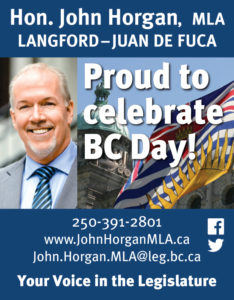 Saturday, August 4 ~ BC. Premier John Horgan has issued the following statement in celebration of BC Day:
Saturday, August 4 ~ BC. Premier John Horgan has issued the following statement in celebration of BC Day:
“On BC Day, the Government of British Columbia is joining people who are coming together to celebrate this beautiful province that we are so lucky to live in.
“British Columbia has been shaped by the people who have come together to help build and protect this extraordinary place. Our communities are made great by the talent and ingenuity of the people who live here, and by the values of diversity, inclusion and mutual respect that bring us together.
“As we celebrate BC, we recognize our shared responsibility to advance reconciliation together with Indigenous peoples who have lived on this land since time immemorial, and to work together to right historical wrongs and build a better future.
“Let’s take the time to celebrate what we love about British Columbia. Visit a local farmers market, community event, go hiking or camping, or spend time with friends and family.
“We’re going to keep investing in people and working to make life better, with more opportunities for every person in every part of the province. I’m excited for the bright future ahead – for everyone in BC. Happy BC Day!”
Thursday, August 2 ~ BC. Minister statement on U.S. Department of Commerce newsprint duties. Bruce Ralston, Minister of Jobs, Trade and Technology, has made the following statement in response to the U.S. Department of Commerce’s final decision to impose countervailing and anti-dumping duties of 20.26% on Catalyst Paper’s newsprint exports to the U.S.:
“BC is very frustrated and concerned about the continued effect these unwarranted punitive duties will have on BC’s forest sector and on the families in communities across BC whose livelihoods rely on it.
“These unfair U.S. duties, while lower than the preliminary duties of 28.25%, are affecting companies like Catalyst that support about 6,500 jobs in the province. We are committed to fighting for workers, industry and our communities, and to maintaining BC’s strong exports of pulp and paper.
“Our government and the Government of Canada have repeatedly raised this issue with our U.S. counterparts in hopes that common sense will prevail. Although these duties have been confirmed by the Department of Commerce, we know there has been an unprecedented level of opposition from across the U.S. political spectrum and industry.
“We urge the International Trade Commission (ITC) to do what is right and determine that the U.S. industry has not been injured, and overturn the Department of Commerce’s decision. Should the ITC ignore all evidence before it and find that U.S. industry has been injured in this case, we will work with the Government of Canada to pursue all appeals.
“Government has heard the concerns of a broad range of local and provincial stakeholders, including local mayors, MLAs, as well as others, and is engaged with Catalyst as the company seeks to stabilize its operations in the face of these unfair duties.
“The governments of BC and Canada demonstrated clearly during the investigation that they are not subsidizing Catalyst’s operations, and the Department of Commerce’s decision to continue to apply duties of over 20% on Catalyst’s exports is upsetting.”
BC & NATIONAL Breaking News Archive: January & February 2018
BC & NATIONAL Breaking News Archive: November & December 2017
BC & NATIONAL Breaking News Archive: September & October 2017
BC & NATIONAL Breaking News Archive: July-August 2017
BC & NATIONAL Breaking News Archive: June 2017
BC & NATIONAL Breaking News Archive: April & May 2017
BC & NATIONAL Breaking News Archive: March 2017
BC & NATIONAL Breaking News Archive: February 2017
BC & NATIONAL Breaking News Archive: January 2017
BC & NATIONAL Breaking News Archive: October through December 2016
BC & NATIONAL Breaking News Archive: September 2016
BC & NATIONAL Breaking News Archive: August 2016
BC & NATIONAL Breaking News Archive: July 2016
BC & NATIONAL Breaking News Archive: February through June 2016
 [column width=”100%” padding=”10px”] Contributions of articles, insights and photos welcome. Write to: editor@westshorevoicenews.com or tel/text 250-217-5821. Twitter: @WestShoreVOICE .[/column]
[column width=”100%” padding=”10px”] Contributions of articles, insights and photos welcome. Write to: editor@westshorevoicenews.com or tel/text 250-217-5821. Twitter: @WestShoreVOICE .[/column]
[end_columns]


